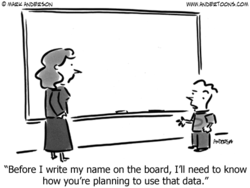Arikpo Dada’s Updates
Update 4: Data Driven
In his TEDxWestVancouverED talk, Khurram Virani discusses the complexities of education and the challenges faced in improving teaching and curriculum. With the already demanding task of teaching, creating a curriculum that is complete and meets the needs of the many students in the class is a great challenge.
In order to meet these growing demands for the position, education must be like other industries and balance both science and art. Virani pulls from educators like Sir Ken Robinson and Allen Eagle to discuss the need for creativity in schools and the need for innovative thinking within the educational system.
Virani's talk focuses on data-driven education and the importance of using data/information effectively to drive improvements within educational practices. According to him, “data should not just be collected but rather acted upon purposefully.” To do this, Virani discusses the need for rapid iteration based on lean startup methodology currently used in entrepreneurial environments.
Virani believes that embracing rapid iteration allows educators to adapt quicker to circumstances over time. To show this point, he refers to the "marshmallow challenge" in which participants must make a free-standing structure with spaghetti and marshmallows. Successful participants quickly learn from and adapt to failed attempts through repeated iterations.
Educators are encouraged to bridge the gap between their vision for what should be in education and what currently exists by embracing innovation through rapid iteration. Virani believes that we can foster a more adaptable educational system capable of addressing future challenges effectively while remaining grounded in evidence-based practices to empower students with better learning experiences tailored to their evolving needs.
As a STEM educator with over 10 years of experience, I have found that performance-based learning experiences are essential for creating an engaging and effective learning environment. Through my work, I have seen firsthand how hands-on activities and real-world projects can greatly enhance students' understanding and retention of STEM concepts. I believe in the value of data collection and its proper use in education, because it allows for personalized instruction and continuous improvement in teaching methods. My experiences have shown me that incorporating practical applications of STEM principles not only enhances student engagement but also fosters a deeper understanding of the subject matter. This approach is crucial for preparing students to succeed in a rapidly evolving technological world.


